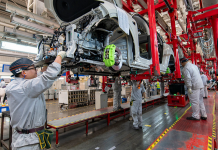BEIJING: Placed in an exhibition hall of a Beijing industrial park is a model of a hydrogen fuel cell truck. Its cabin contains a mini-washing machine and a sink, and the drivers can reuse water generated by the operation of the vehicle-mounted hydrogen fuel cell to wash their clothes and hands.
This heavy-duty tractor, named H49, is developed by Hybot, a tech firm focusing on hydrogen fuel cell commercial vehicle solutions, based in Guangzhou in south China’s Guangdong Province. “Its fuel costs are even lower than diesel trucks,” Sun Ying, CEO of Hybot, told Xinhua.
A road test on an expressway running through the plains of central China’s Hubei Province revealed that the fuel costs of a fully-loaded H49 truck were about 2.14 yuan (roughly 0.3 U.S. dollars) per kilometer, lower than the average cost of 2.31 yuan for diesel trucks under the same conditions, according to Sun.
After mass production, costs could be further reduced, Sun added.
Hydrogen energy is a green and low-carbon secondary energy source with various sources and widespread applications. According to the National Energy Administration (NEA), China sees hydrogen energy as a vital component of the future national energy system and an emerging sector with strategic importance.
“Hydrogen can be produced from water, methanol and even coal. China has abundant reserves of all these energy resources. By developing hydrogen energy, China can take the lead in low-carbon and green development globally,” said Xiang Yan, professor at the School of Energy and Power Engineering at Beihang University in Beijing.
In a corner of the Daxing International Hydrogen Energy Demonstration Zone in the south of the Chinese capital, a line of buses and trucks were waiting their turn to refuel with hydrogen. Though the roar of engines filled the air — there was no pungent smell of exhaust fumes.
This refueling station started operations in 2021 and has increased its refueling capacity to 4.8 tonnes of hydrogen per day.
The zone has attracted more than 250 companies spanning the hydrogen energy supply chain, said Xie Tao from the operator of the zone, who has been working in the hydrogen energy industry for 10 years. Thanks to the growing industrial cluster — businesses within the zone can seamlessly connect with partners and access technology solutions all in one place.
“The hydrogen energy industry is still at a primary stage of development, so the role of the demonstration zone operator is to empower enterprises by helping them reduce R&D costs and provide them with common services,” Xie said.
Notably, the NEA has stated that China plans to master core technologies and manufacturing techniques regarding hydrogen energy in 2025, while aiming to build a primarily complete supply chain and industrial system by 2030.
“What matters in the development of hydrogen energy is commercialization. We start from scratch to build its industrial chain. This process is more than just results in the laboratory,” Xiang said. –Agencies






